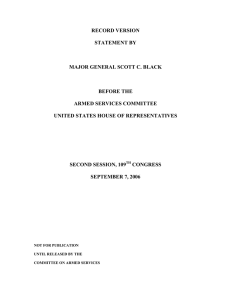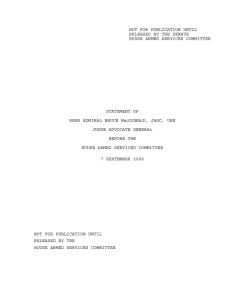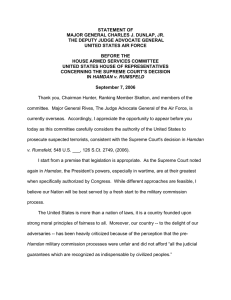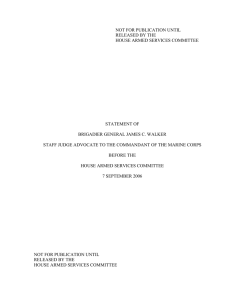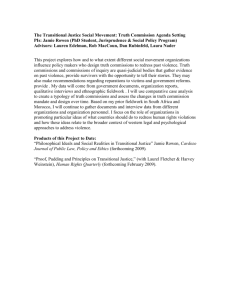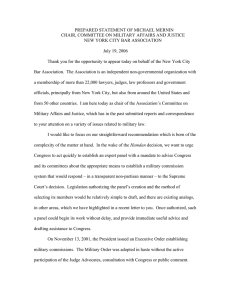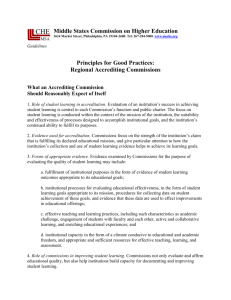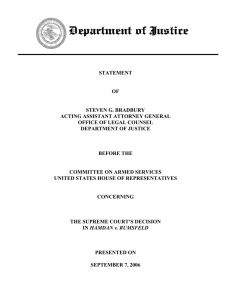STATEMENT of David A. Schlueter
advertisement
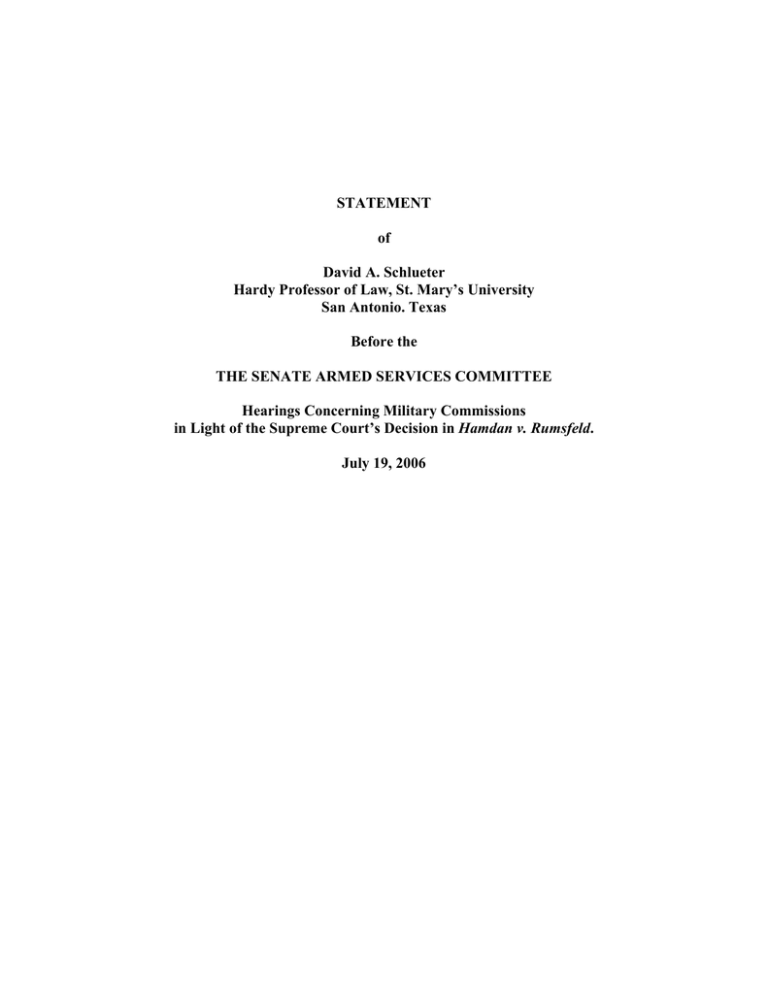
STATEMENT of David A. Schlueter Hardy Professor of Law, St. Mary’s University San Antonio. Texas Before the THE SENATE ARMED SERVICES COMMITTEE Hearings Concerning Military Commissions in Light of the Supreme Court’s Decision in Hamdan v. Rumsfeld. July 19, 2006 2 Statement of Prof. Schlueter Senate Armed Services Committee July 19, 2006 STATEMENT of David A. Schlueter Hardy Professor of Law, St. Mary’s University San Antonio, Texas Before the THE SENATE ARMED SERVICES COMMITTEE Hearings Concerning Military Commissions in Light of the Supreme Court’s Decision in Hamdan v. Rumsfeld. July 19, 2006 I. INTRODUCTION Mr. Chairman, Senator Levin, and Members of the Committee, thank you for the opportunity to address the issue of the status of military commissions in light of the Supreme Court’s recent decision in Hamdan v. Rumsfeld. In that case the Supreme Court held that the military commission that had been convened to try Salim Ahmed Hamdan, violated the U.C.M.J. and Common Article 3 of the Geneva Conventions. The question before Congress is to frame an appropriate legislative response to that opinion. The following discussion addresses the Court’s decision and possible responses to that decision. II. A. HAMDAN V. RUMSFELD, 126 S.CT. 2749 (2006) In General On November 13, 2001, the President issued a military order entitled “Detention, Treatment, and Trial of Certain Non-Citizens in the War Against Terrorism.”1 In that order the President stated, inter alia, that persons identified as members of al Qaeda or as persons who had engaged in terrorist activities, would be tried by military commissions. The order authorized the Secretary of Defense to appoint military commissions to try those persons. The Secretary did so in Military Commission Order No. 1, dated March 21, 2002. On May 2, 2003, the Department of Defense released eight Military Commission Instructions, which provided more specific guidance on military commission procedures. 1 66 Fed. Reg. 57833. Statement of Prof. Schlueter Senate Armed Services Committee July 19, 2006 3 Salim Ahmed Hamdan, a citizen of Yemen, was captured, detained, and charged with one count of conspiracy, and was set to be tried by a military commission, sitting at Guantanamo Bay, Cuba. Hamdan sought habeas corpus relief in a federal district court in the District of Columbia, which granted him relief on his arguments that first, the President lacked the authority to establish military commissions to try him for a conspiracy and second, the procedures to be used by the military commission violated the basic tenets of international and military law.2 The United States Court of Appeals for the District of Columbia, reversed.3 The Supreme Court reversed the Court of Appeals and concluded that first, it had the authority to review the case4 and second, that the military commission that had been convened to try Hamdan lacked jurisdiction because “its structure and procedures violate both the U.C.M.J. (the Uniform Code of Military Justice) and the Geneva Conventions.”5 Four members of the Court agreed that the crime of conspiracy was not a crime recognized by the law of war and therefore could not be tried by military commission. Regarding the President’s authority, the Court concluded that because the commission at issue was not expressly authorized by Congress, its task, as in Ex parte Quirin,6 was to decide whether Hamdan’s military commission was authorized. The Court reviewed the long history of military commissions, and noted that they have typically been used in three situations: First, military commissions have been used as substitutes for civilian courts where martial law has been declared; Second, military commissions have been used to try civilians where a temporary military government has been established and the local courts are not functioning; and Third, military commissions have been convened as incident to war where “there is a need to seize and subject to disciplinary measures those enemies who in their attempt to thwart or impede our military effort have violated the law of war.”7 The third type, the Court said, was last used in World War II and was primarily a factfinding body to determine whether the person charged had violated the law of war. Its jurisdiction, the Court said, was limited to offenses recognized during a time of war. B. 2 The President’s Authority to Authorize Military Commissions 344 F.Supp.2d 152 (D.C. 2004). 415 F.3d 33 (D.C. Cir. 2005). 4 The Court rejected the government’s argument that § 1005(e)(1) of the Detainee Detention Act of 2005 (DTA) stated that no court would have the jurisdiction to hear or consider any writ of habeas corpus filed by persons detained at Guantanamo Bay. 5 126 S.Ct. at 2759. 6 317 U.S. 1 (1942). 7 126 S.Ct. at 2776. 3 Statement of Prof. Schlueter Senate Armed Services Committee July 19, 2006 4 In Hamdan, the Court did not decide whether the President has the independent authority to convene military commissions. It merely held that under the facts of the case, the military commission lacked jurisdiction to try Hamdan. The Court stated that at most, the U.C.M.J, the DTA, and the AUMF acknowledged the President’s authority to convene military commissions in those situations where they were justified under the Constitution and the laws, including the law of war. The Court reviewed prior cases on the subject and concluded that in those cases, the Court had concluded that under the facts, the commissions in question were legal and consistent with the Constitution. C. Limits on the President’s Authority to Authorize Military Commissions Absent a more express authorization from Congress, the Court said that its task was to decide whether the commission in question was justified. In doing so, the Court analyzed three possible limitations on the President’s authority. 1. Crimes Charged Must Be Cognizable Under the Law of War First, a plurality of the Court concluded that the charge against Hamdan — conspiracy — was not recognized under international law. Even if it were, the plurality said, the alleged acts did not occur in a theatre of war or after September 11, 2001. The Court, however, cited its decision in In re Yamashita, 327 U.S. 1, 13 (1946) for the proposition in that case that “neither Congressional action nor the military orders constituting the commission authorized it to place petitioner on trial unless the charge proffered against him is a violation of the law of war.” An argument could be made that the plurality would recognize Congress’ authority to permit non-law-of-war crimes to be prosecuted by military commission. 2. The Procedures Must Be Uniform with Rules of Procedure for Courts-Martial Second, the Court interpreted Article 36(b) of the Uniform Code of Military Justice to require that the procedural rules for military commissions must be uniform with the rules governing courts-martial, unless it is impractical to do so. Article 36 provides: “§ 836. Art. 36. President may prescribe rules (a) Pretrial, trial, and post-trial procedures, including modes of proof, for cases arising under this chapter triable in courts-martial, military commissions Statement of Prof. Schlueter Senate Armed Services Committee July 19, 2006 5 and other military tribunals, and procedures for courts of inquiry, may be prescribed by the President by regulations which shall, so far as he considers practicable, apply the principles of law and the rules of evidence generally recognized in the trial of criminal cases in the United States district courts, but which may not be contrary to or inconsistent with this chapter. (b) All rules and regulations made under this article shall be uniform insofar as practicable.” The Court stated that Article 36 places two limits on the President’s authority to establish the rules for military commissions. First, Article 36(a) requires the President to promulgate rules of procedure that mirror the federal rules of practice, to the extent practical and to the extent that they are not contrary or inconsistent with the U.C.M.J. The Court apparently agreed that the President had made that determination in his November 13, 2001 order. Second, the Court held that Article 36(b) requires that the rules for military commissions be uniform with the rules for courts-martial, insofar as such rules are practical. The Court stated that there was nothing in the record to show that the President had made such a determination in this case. The Court detailed several procedural rules for Hamdan’s military commission and concluded that they were clearly inconsistent with established practices for courtsmartial. In particular, the Court was concerned about the provisions in the commission rules that would preclude the accused from hearing the evidence against him. 3. The Procedures Must Comply with Common Article 3 of the Geneva Conventions Finally, the Court held that the commission rules also violated the Geneva Conventions. 8The Court of Appeals had concluded that the Geneva Conventions did not apply because (1) those conventions are not judicially enforceable, (2) Hamdan was not entitled to their protections, and (3) even if he was entitled to their protections, the Schlesinger v. Councilman9 abstention doctrine applied. Without deciding the merits of the argument that Hamdan was not entitled to the full protections of the Conventions because the conflict is not between signatory states, the Court concluded that one of the provisions, what is referred to as Common Article 3, did apply. That article appears in all four Geneva Conventions and requires that if the conflict in question is not international in character, a party to the conflict may not pass a sentence without a “previous judgment by a regularly constituted court affording all the judicial guarantees…recognized as indispensable by civilized peoples.”10 The Court concluded that at a minimum, a military 8 126 S.Ct. at 2793. 420 U.S. 738 (1975) (civilian courts should not interfere with ongoing court-martial proceedings). 10 126 at 2795 (citing Common Article 3). 9 Statement of Prof. Schlueter Senate Armed Services Committee July 19, 2006 6 commission “can be regularly constituted by standards of our military justice system only if some practical need explains deviations from court-martial practice.” And that need had not been shown, the Court said. D. What the Supreme Court Did Not Hold In analyzing a legislative response to the Court’s decision in Hamdan, it is important to briefly address what the Court did not hold: First, the Court did not address the merits of the arguments on whether the full force and effect of the Geneva Conventions apply to the detainees held in Guantanamo Bay, Cuba. Second, the Court did not hold that the President lacks authority under the Constitution to convene military commissions. Third, the Court did not hold that certain provisions in the U.C.M.J. or the Manual for Courts-Martial must be applied to military commissions. Fourth, the Court did not hold that only war crimes could not be tried by a military commission. III FORMULATING A LEGISLATIVE RESPONSE TO HAMDAN A. In General In its opinion, the Supreme Court stated that if “Congress, after due consideration deems it appropriate to change the controlling statutes, in conformance with the Constitution and other laws, it has the power and prerogative to do so.”11 There are at least two issues that should be legislatively addressed in response to the Court’s decision in Hamdan: First, despite the long historical debate and conversations about the President’s authority to convene military commissions, the Court in Hamdan did not directly address that issue. In my view, Congress should address that issue head on and codify the President’s authority to do so. Second, the Court in Hamdan focused a great deal on its perceived requirement in Article 36(b), U.C.M.J., to make the procedural rules of military commissions and courts- 11 126 S.Ct. at 2799. Statement of Prof. Schlueter Senate Armed Services Committee July 19, 2006 7 martial uniform. That is not a commonly-held viewpoint, and for reasons discussed below, Article 36 should be amended to make it clear that uniformity is not required. Given the long-standing role of Congress in exercising its Constitutional powers under Article 1 § 8 (concerning the rules and regulations for the armed forces) it is appropriate for Congress to map out only broad policy guidelines for implementing military commissions, and leave to the President and the Department of Defense the task of more specifically setting out the procedures and rules to be used. B. Addressing the President’s Power to Create Military Commissions. One of the first issues deserving Congressional attention is the long-standing question about the President’s authority to convene military commissions. In the past, when it reviewed the constitutionality of military commissions, it either assumed that the President had the inherent authority, as Commander in Chief, to convene such tribunals, or that Congress in some way had authorized such tribunals. In Hamdan, the Court noted that because Congress had not specifically authorized a military commission to try the accused, the Court’s duty was to determine whether the commission, assuming the President had the authority to convene commissions generally, had properly done so in Hamdan. An appropriate first step would be to amend the U.C.M.J. to address explicitly the President’s authority to convene military commissions. That amendment could take the form of a new Article that would provide the authority, with or without any other limitations concerning when such commissions might be authorized. That new provision could also address the President’s authority to promulgate rules of procedure for conducting such commissions, a subject addressed below. That amendment could also include a reference to the three types of military commission recognized by the common law and addressed in the Court’s opinion in Hamdan. A proposed amendment to the U.C.M.J., in form of adding a new Article 5a is at the end of this statement. C. Addressing the Uniformity-of-Rules Requirement in Article 36(b) 1. In General One of the key, and more difficult, points made by the Supreme Court in Hamdan was the fact that the proposed commission rules of procedure were inconsistent with the Uniform Code of Military Justice. The Court relied heavily upon language in Article 36(b), which the Court said, required the President to apply the rules used in courts- Statement of Prof. Schlueter Senate Armed Services Committee July 19, 2006 8 martial to the military commission. As pointed out by Justice Thomas in his dissent, it is not clear where the majority got that particular reading from the statute.12 The most common reading given to Article 36(b) is that the uniformity requirement was designed to make the practices in the various armed forces uniform, in response to the sometimes disparate practices that existed before the U.C.M.J. was enacted in 1950. Notwithstanding its reading of Article 36(b), the Court recognized the ability of Congress to amend the U.C.M.J.13 At first blush it would seem an easy task to simply merge the existing U.C.M.J. provisions and the Rules for Courts-Martial (R.C.M.’s) found in the Manual for CourtsMartial into any military commission. Doing so is not only not feasible —given the complexity of existing statutory and Manual provisions — but could actually undermine the very purposes and functions of military commissions. That purpose is to expeditiously, without the unnecessary sacrifice of due process, determine whether a given person has committed an alleged offense, and if so, to justly determine a fitting punishment. In considering the question of simply adopting existing court-martial procedures into military commissions, it is important to first briefly set out the modern court-martial procedures. 2. How Courts-Martial Function Courts-martial, which are only temporary tribunals, are created to determine the guilt or innocence of persons accused of committing offenses while subject to the jurisdiction of the Armed Forces. Some would argue that they are designed to enforce discipline and others, to insure that justice is done.14 The current court-martial is a temporary tribunal, convened by a commander to hear a specific case. It is not a part of the federal judiciary and is not subject to direct judicial 12 126 S.Ct. at 2842 (Thomas, J., dissenting). Paragraph 2(b)(2) to the Preamble to the Manual for CourtsMartial states, however, that: Military commissions and provost courts for the trial of cases within their respective jurisdictions. Subject to any applicable rule of international law or to any regulations prescribed by the President or by other competent authority, military commissions and provost courts shall be guided by the appropriate principles of law and rules of evidence prescribed for courts-martial. The Preamble is part of the “supplementary materials” published by the Department of Defense and Department of Transportation. They do not constitute the official views of the DOD or any other agency and “do not constitute rules.” Discussion, Preamble to the Manual for Courts-Martial (2005). And R.C.M. 101, Scope, states only that the Rules for Courts-Martial apply to procedures for courts-martial. No mention is made of other military tribunals. 13 126 S.Ct. at 2799. 14 See Schlueter, MILITARY CRIMINAL JUSTICE: PRACTICE AND PROCEDURE, § 1-1 (6th Ed. 2004) Statement of Prof. Schlueter Senate Armed Services Committee July 19, 2006 9 review in that system. In some points, the court-martial provides greater safeguards than its civilian counterparts, and a brief survey of the current practice bears this out. Before swearing and preferring court-martial charges, a company commander is responsible for conducting a thorough and impartial inquiry into the charged offenses.15 This almost always involves obtaining legal advice from a judge advocate. During that investigation, an accused is entitled to the protections of the Fourth Amendment, vis a vis searches and seizures, the privilege against self-incrimination, and the Sixth Amendment right to counsel, for example, at a pretrial lineup. Those protections are provided not only by case law, which as concluded that those Constitutional protections extend to servicemembers, but perhaps more importantly by the Military Rules of Evidence.16 If charges are preferred they are moved up the chain of command for recommendations and actions by higher commanders. If the command believes that the charges are serious enough to warrant a general court-martial (roughly equivalent to a civilian felony trial) the commander orders that an Article 32 investigation to be held.17 At that investigation the accused is entitled to be present, to have the assistance of counsel, to cross-examine witnesses, and to have witnesses produced. Although the Article 32 investigation is often equated with a civilian grand jury, in many ways it is far more protective of an accused’s rights than a grand jury. If the command decides to refer the charges to a court-martial, the convening authority selects the court members, but does not select either the counsel or the military judge. Specific provisions in the U.C.M.J. prohibit a convening authority from unlawfully influence the participants or the outcome of the case. The accused is entitled to virtually the same procedural protections he would have in a state or federal criminal court —largely as a result of the requirement in Article 36(a) that the rules of procedure for military courts are supposed to parallel the procedures used in federal courts. For example, a military accused is granted: 15 the right to a speedy trial (under the Sixth Amendment and under a 120-day speedy trial provision in the Manual for Courts-Martial); extensive discovery, that is supposed to be co-equal with the right of discovery for the prosecution; the right to production of evidence for examination and testing; the right to request witnesses, including expert witnesses; the right to request the assistance of experts in preparing for trial; the right to confront witnesses; Art. 30, U.C.M.J. See Mil. R. Evid. 301 (privilege against self-incrimination); Mil. R. Evid. 304 (procedures for determining admissibility of accused’s statements); Mil. R. Evid. 305 (Article 31(b) warnings and right to counsel warnings); Mil. R. Evid. 311-316 (rules addressing requirements for searches and seizures); and Mil. R. Evid. 321 (admissibility of eyewitness identifications). 17 Art. 32, U.C.M.J. 16 Statement of Prof. Schlueter Senate Armed Services Committee July 19, 2006 10 the right to select either a trial with members or a trial by the judge alone (bench trials); the right to request inclusion of enlisted members, if the accused selects trial by members (effectively a jury trial); the right to full voir dire of the court members and the right to exercise both challenges for cause and peremptory challenges; the ability to challenge the military judge for cause; the right to file motions in limine, motions to suppress, and motions to dismiss the charges on a wide range of grounds (for example invoking constitutional privacy rights to dismiss rules or regulations governing personal conduct). In many cases the accused and the convening authority engage in plea bargaining and execute a pretrial agreement. Typically, those agreements require the accused to plead guilty in return for a guaranteed maximum sentence. Before accepting a guilty plea, the military judge is required to conduct a detailed “providency” inquiry to insure that the accused is pleading guilty voluntarily and knowingly, and that a sufficient factual basis supports the accused’s plea. If the accused pleads not guilty, during the trial the Military Rules of Evidence apply.18 Those rules, which mirror the Federal Rules of Evidence, include a number of rules not found in the latter. For example, Section III of the Military Rules includes very specific guidance on searches and seizures, confessions, eyewitness identification, and interception of oral and wire communications. Section V contains thirteen detailed rules governing privileges. In particular, Military Rule of Evidence 505 provides very detailed guidance on disclosure of classified information and Rule 506 provides equally specific guidance of disclosure of government information that would be detrimental to the public interest. Sentencing is usually a separate proceeding. The rules of evidence (unlike in the federal system) apply at the sentencing phase. During sentencing, the accused is entitled to present witnesses and other evidence for the court’s consideration, and to challenge the prosecution’s evidence. The post-trial procedures are extremely detailed. A copy of the record of trial is given to the accused, at no cost. Depending on the level of punishment imposed, a formal legal review of the proceedings is prepared. The post-trial review and recommendations are presented to the convening authority for consideration. During that process the accused has the right to present clemency matters to the convening authority. For certain courts-martial, appellate review is automatic in the one of the service Courts of Criminal Appeals. Appellate counsel is provided free of charge. Review in the military appellate courts may take upwards of one-year. The members of those courts are high-ranking military officers. Those courts are given fact-finding powers and have the authority to reassess a court-martial sentence. 18 See generally Saltzburg, Schinasi & Schlueter, MILITARY RULES OF EVIDENCE MANUAL (5th Ed. 2003). Statement of Prof. Schlueter Senate Armed Services Committee July 19, 2006 11 An accused may petition for further review by the United States Court of Appeals for the Armed Forces, which sits in Washington, D.C. That court is composed of five civilian judges, who are appointed for 15-year terms. The time from the initial trial to completion of review by the Court of Appeals can typically take several years. During appellate review, it is not unusual to find a court-martial being reversed for violation of one of the many procedural rules, summarized above. An accused may then seek certiorari review at the Supreme Court of the United States. 3. Why Attempting to Make the Rules for Court-Martial and Rules for Military Commissions Uniform Raises Additional Problems There are several reasons why attempting to simply use either the U.C.M.J. or the Manual for Courts-Martial as a default system for military commissions potentially causes additional problems. First, it is essential that military commissions be able to operate quickly and efficiently to determine guilt or innocence and if a person is found guilty, an appropriate sentence. Applying the Rules for Courts-Martial and the Military Rules of Evidence provide valuable due process rights for servicemembers — that may rival the protections provided in the civilian system. Applying them in a military commission setting could virtually bog down the system in delays experience in everyday courtrooms. Second, it seems clear that using the U.C.M.J. or the Manual for Courts-Martial as a presumed template for military commissions could require a drastic overhaul of those provisions. For example, Military Rules of Evidence contain a number of privileges. Given the nature of the controversy regarding privileges, Congress in enacting the Federal Rules of Evidence in 1975 could not agree on a set of privilege rules and instead left it to the federal courts to determine which privileges to adopt and which to reject. The Military Rules of Evidence, on the other hand specifically cover communications such as the clergy member privilege. 19 Deciding which privileges to apply, and when, would be a very difficult task. Similarly, the U.C.M.J. and the Military Rules of Evidence provide very detailed guidance for rights-warnings to suspects and very detailed guidance on obtaining evidence by search and seizure. Those rules would have to be completely rewritten to 19 Mil. R. Evid. 503. If the Military Rules of Evidence were to apply to military commissions, unaltered, an unlawful combatant being tried by military commission could exclude any statements he or she made to a spiritual advisor, notwithstanding the fact that the statement was completely voluntary and overhead by a guard. One option would be to state that none of the privileges in the Rules of Evidence apply, but that would also preclude invocation of the attorney-client privilege. An alternative option would be to go through each privilege and determine which provision applied or did not apply to a military commission. Statement of Prof. Schlueter Senate Armed Services Committee July 19, 2006 12 address any exceptions for military commissions. In the alternative, Congress or the President could draft a provision in the U.C.M.J. or the Manual for Courts-Martial that explicitly exempted various rules in those sources. Legislatively, that would be extremely cumbersome. 4. Proposal: Amend Article 36(b) to Make it Clear that the Uniformity Requirement Applies Only to Courts-Martial and Create a Separate Provision for Military Commission Procedures As a starting point for redrafting any rules governing military commissions, it would be important to make clear, what many have assumed to be the case, that Article 36(b) was intended to apply to uniform rules of practice among the armed forces. First, and to that end, Article 36(b) should be amended to state clearly that the uniformity requirement extends only to courts-martial. The text of the proposed amendment is below. Second, a new provision should be added to the U.C.M.J., specifically addressing the adoption of procedural rules for military commissions. The Hamdan decision is a good starting point for identifying key procedural due process protections that civilized nations would expect to exist in any tribunal. In addition, common principles of procedural due process would inform the drafters of such rules: the right to be present during all proceedings; the right to the assistance of counsel; the right to cross-examine government witnesses and challenge the government evidence; the right to be heard; and the right to an appeal by an impartial body. In the discussions following Hamdan, much has been made about applying the authentication and hearsay rules. Clearly, those rules, although basic to the everyday courtroom practice in both civilian and military courts would have to be adjusted for practice in the military commissions. So too, would the now-accepted discovery rules have to be carefully considered. The task for drafting these military commission rules should rest first in the President and Department of Defense. That is the model that has been used for decades and generally works well. Given the delicate, and potentially international, nature of military commission proceedings, Congress could require that the President report the rules to Congress. In any event, it is clear from Hamdan that any rules adopted by the President, with or without Congressional approval, will be subject to review in the federal courts. IV. CONCLUSIONS AND RECOMMENDATIONS The Supreme Court’s decision in Hamdan v. Rumsfeld provides the Congress and the President with an opportunity to re-evaluate the subject of military commissions, 13 Statement of Prof. Schlueter Senate Armed Services Committee July 19, 2006 specifically the authority of the President to convene such tribunals and consideration of rules of procedure that will be consistent with the Constitution and the rule of law. To those ends, two amendments to the U.C.M.J. seem appropriate. The first amendment would be to add a new Article 5a, which would address the President’s authority to convene military commissions, and second, address the promulgation of procedural rules for those commissions. The second amendment would address the uniformity requirement in Article 36(b) to make it clear that that provision applies only to uniformity concerning courtmartial practices among the armed forces. The proposed amendments are as follows. New material is underlined, and language to be deleted is struck through: § 805a. Article 5a. Authority to Convene Military Commissions; Rules of Procedure (a) The President may convene military commissions to — (1) (2) (3) (b) Serve as a substitute for civilian courts at times and locations where martial law has been declared; Try foreign nationals as part of a temporary government over occupied territories where the civilian government cannot and does not function; and Try foreign nationals accused of violating the law of war, during times of war. Pretrial, trial, and post-trial procedures, includes modes of proof, for cases tried before military commissions, may be prescribed by the President, which are not inconsistent with fundamental guarantees of due process. NOTES Proposed Article 5a explicitly codifies the historically recognized authority of the President to appoint military commissions. Subdivision (a) states the three types and functions of military commissions, recognized by the plurality in Hamdan. 126 S.Ct. at 2775-76 (citing authorities). Subdivision (b) authorizes the President to promulgate rules for military commissions. The baseline for such rules would be fundamental concepts of due process. 14 Statement of Prof. Schlueter Senate Armed Services Committee July 19, 2006 “§ 836. Art. 36. President May Prescribe Rules (a) Pretrial, trial, and post-trial procedures, including modes of proof, for cases arising under this chapter triable in courts-martial, military commissions and other military tribunals, and procedures for courts of inquiry, may be prescribed by the President by regulations which shall, so far as he considers practicable, apply the principles of law and the rules of evidence generally recognized in the trial of criminal cases in the United States district courts, but which may not be contrary to or inconsistent with this chapter. (b) To the extent practicable, the rules governing cases triable in courtsmartial shall be uniform for all armed forces. All rules and regulations made under this article shall be uniform insofar as practicable.” NOTES The amendment to Rule 36(b) would make it clear that the uniformity requirement extends only to courts-martial procedures. It would thus create a clean slate for adopting military commission rules that more carefully address the balance between the function and purposes of military commissions, the basic due process rights of an accused, and preservation of national security. Clarifying the uniformity requirement in Article 36(b) does not answer the question of what rules should be adopted for military commissions. But it does free the drafters of such rules from the strictures of the very detailed procedural and evidentiary codes now applied to courts-martial and yet still adopt rules that comport with basic due process.
